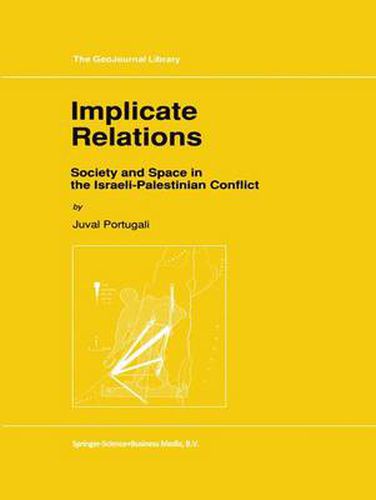Readings Newsletter
Become a Readings Member to make your shopping experience even easier.
Sign in or sign up for free!
You’re not far away from qualifying for FREE standard shipping within Australia
You’ve qualified for FREE standard shipping within Australia
The cart is loading…






This title is printed to order. This book may have been self-published. If so, we cannot guarantee the quality of the content. In the main most books will have gone through the editing process however some may not. We therefore suggest that you be aware of this before ordering this book. If in doubt check either the author or publisher’s details as we are unable to accept any returns unless they are faulty. Please contact us if you have any questions.
The title of this book is suggested as a notion which characterizes the nature of social relations in general and the relationships between Israelis and Palestinians in particular. According to it, Israelis and Palestinians, as societies and as individuals, are not definable independently of each other. In a kind of implicate relation, one is enfolded within the other, to the extent that Palestinian national identity can be seen as a Zionist creation. Implicate relations further implies that societies are socio-spatial entities which come into being and acquire their collective self-consciousness and self-identity through a process of spatial dialects. As illustrated throughout the discussions in the book, spatial dialects was the process through which European Jews were driven into an identity crisis once their (spatial) ghetto walls disintegrated and they thus became conscious of their nationalist-political identity. And it is this process through which, several decades later, the Arabs in Israel were forced into an identity crisis and became conscious of their Palestinian national identity once the Zionists had defined the boundaries of their future Jewish state. It is also a process through which Israelis and Palestinians became engaged in implicate relations. This is illustrated in the book by reference to historical events which have led to the emergence of Israelis and Palestinians as a socio-spatial entities, and by means of empirical analyses of Palestinian labour in Israel, Jewish settlement in the occupied territories, and cognitive maps of Israelis and Palestinians. These empirical analyses are based on data collected in three large-scale field surveys among Palestinian workers and job hunters in Israel, and among Israeli settlers in the occupied territories.
$9.00 standard shipping within Australia
FREE standard shipping within Australia for orders over $100.00
Express & International shipping calculated at checkout
This title is printed to order. This book may have been self-published. If so, we cannot guarantee the quality of the content. In the main most books will have gone through the editing process however some may not. We therefore suggest that you be aware of this before ordering this book. If in doubt check either the author or publisher’s details as we are unable to accept any returns unless they are faulty. Please contact us if you have any questions.
The title of this book is suggested as a notion which characterizes the nature of social relations in general and the relationships between Israelis and Palestinians in particular. According to it, Israelis and Palestinians, as societies and as individuals, are not definable independently of each other. In a kind of implicate relation, one is enfolded within the other, to the extent that Palestinian national identity can be seen as a Zionist creation. Implicate relations further implies that societies are socio-spatial entities which come into being and acquire their collective self-consciousness and self-identity through a process of spatial dialects. As illustrated throughout the discussions in the book, spatial dialects was the process through which European Jews were driven into an identity crisis once their (spatial) ghetto walls disintegrated and they thus became conscious of their nationalist-political identity. And it is this process through which, several decades later, the Arabs in Israel were forced into an identity crisis and became conscious of their Palestinian national identity once the Zionists had defined the boundaries of their future Jewish state. It is also a process through which Israelis and Palestinians became engaged in implicate relations. This is illustrated in the book by reference to historical events which have led to the emergence of Israelis and Palestinians as a socio-spatial entities, and by means of empirical analyses of Palestinian labour in Israel, Jewish settlement in the occupied territories, and cognitive maps of Israelis and Palestinians. These empirical analyses are based on data collected in three large-scale field surveys among Palestinian workers and job hunters in Israel, and among Israeli settlers in the occupied territories.